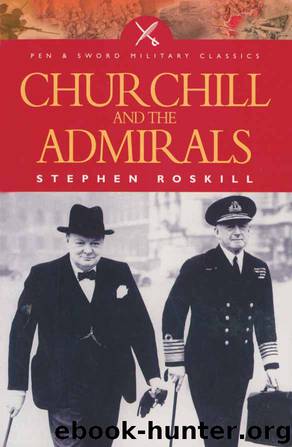Churchill and the Admirals by Stephen Roskill

Author:Stephen Roskill
Language: eng
Format: epub
Publisher: Pen & Sword
Published: 2004-10-08T16:00:00+00:00
CHAPTER 11
The Indian Ocean and the Far East
1941–1943
Churchill’s pre-war blindness with regard to the Japanese threat to the vast British interests east of Suez, about which the Service Staffs were so deeply worried, has already been mentioned; but the outbreak of hostilities in Europe by no means altered his stance. In September 1940 he told Alexander, the First Lord, that “The NED [Naval Intelligence Division] are very much inclined to exaggerate Japanese strength and efficiency.’1 Although in February 1941 he admitted to President Roosevelt that ‘the weight of the Japanese Navy, if thrown against us, would confront us with situations beyond the scope of our naval reserves’ he qualified those apprehensions by adding ‘I do not myself think that the Japanese would be likely to send [the] large military expedition necessary to lay siege to Singapore.’2 As late as August of that year he still felt that Japan ‘would lie quiet for a while’, but he was prepared to send out a modern battleship, which he considered ‘might indeed be a decisive deterrent’;3 and early in November he told Roosevelt ‘We are sending that big ship you inspected [the Prince of Wales] into the Indian Ocean as part of a squadron we are forming there. This ought to serve as a deterrent on Japan.’4 It is therefore plain, firstly, that it was Churchill, not the naval staff, which underrated Japanese prowess and efficiency; and secondly that the deterrent concept dominated his thinking on Far East strategy almost to the eleventh hour. Without doubt this misjudgement arose chiefly from the deep impression made on him by the effect on the Home Fleet’s dispositions of the presence of the very powerful German battleship Tirpitz in Norwegian waters; and he sought to draw an analogy between her influence and that which a single British battleship would have on Japan – despite the fact that conditions in the two theatres were of course very different. Looking back on the events of this period Churchill remarked in his memoirs that ‘I am sure that nothing we could have spared at this time … would have changed the march of fate in Malaya’;5 but the very large, though not properly trained or equipped land and air reinforcements which were rushed to Singapore after the Japanese attack surely gives the lie to Churchill’s comment. What ‘we could have spared’ depended of course on getting priorities right; and the Far East stood low in that respect.6
Towards the end of August 1941 Churchill reverted to the deterrent concept, telling Pound that ‘It should become possible in the near future to place a deterrent force in the Indian Ocean’, and that if it were done it ‘should consist of the smallest number of [the] best ships …’ Pound replied that, depending on the situation and if war had not broken out with Japan, ‘it may be found desirable to send Nelson, Rodney, Renown and an aircraft carrier to Singapore in the first instance as they would [then] form a greater deterrent’; but if war broke out ‘they would have to retire to Trincomalee’.
Download
This site does not store any files on its server. We only index and link to content provided by other sites. Please contact the content providers to delete copyright contents if any and email us, we'll remove relevant links or contents immediately.
The Radium Girls by Kate Moore(12013)
100 Deadly Skills by Clint Emerson(4917)
Rise and Kill First by Ronen Bergman(4776)
The Templars by Dan Jones(4681)
The Doomsday Machine by Daniel Ellsberg(4482)
The Rape of Nanking by Iris Chang(4200)
Killing England by Bill O'Reilly(3994)
Stalin by Stephen Kotkin(3956)
Hitler in Los Angeles by Steven J. Ross(3938)
12 Strong by Doug Stanton(3541)
Hitler's Monsters by Eric Kurlander(3327)
Blood and Sand by Alex Von Tunzelmann(3192)
The Code Book by Simon Singh(3175)
Darkest Hour by Anthony McCarten(3117)
The Art of War Visualized by Jessica Hagy(3000)
Hitler's Flying Saucers: A Guide to German Flying Discs of the Second World War by Stevens Henry(2744)
Babylon's Ark by Lawrence Anthony(2671)
The Second World Wars by Victor Davis Hanson(2521)
Tobruk by Peter Fitzsimons(2504)
